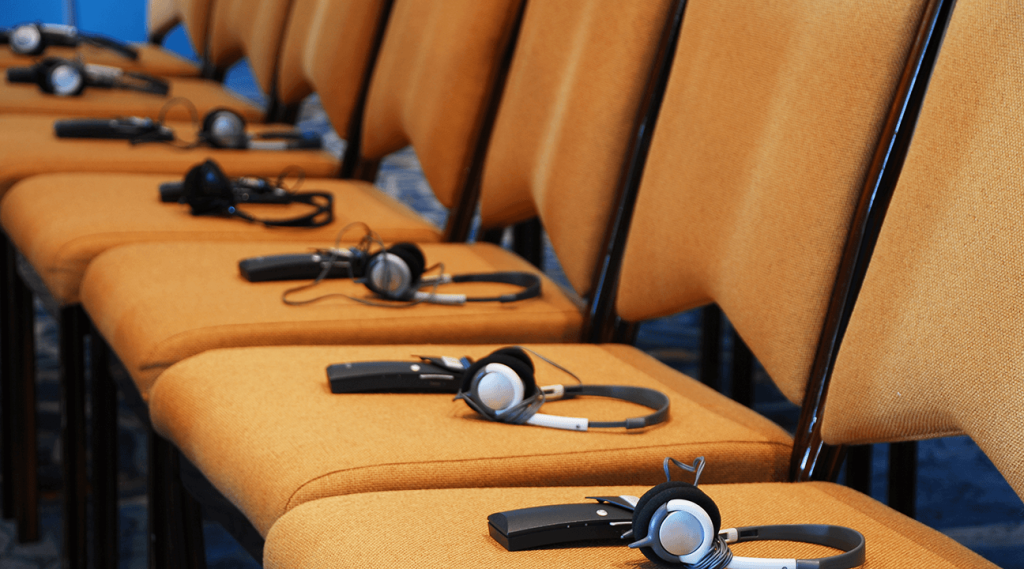Any good conference takes preparation, sometimes months of work goes on unseen before the main event, but when working with a multilingual audience and interpreters there are extra concerns that should be considered.
For your event to be successful you should begin working with your interpreters as early as possible, well in advance of the conference, this way your hard work and preparation for the actual speech will be well rewarded.
To help you create the best possible conference we have compiled a check list below which offers advice on steps to follow before the event, and on the day.
These will ensure your day goes smoothly, your audience is happy, your interpreters are successful, and, most importantly your event is outstanding.
Before the event
Decide upon the type of interpreting you require on the day – either consecutive (where the speaker pauses to allow for translation) or simultaneous (where the interpreter speaks at the same time as the main speaker with a delay of a few seconds). Some events may require both for example, if you are having workshops and presentations.
Choose the right sound equipment – the type of interpreting you will use will influence the equipment needed. You may not need much equipment if using consecutive interpretation as these are generally smaller, less formal gatherings where a mic and speaker may be sufficient. However, if using simultaneous interpretation there are other factors that need to be assessed before selecting the right sound equipment.
The list below should help you decide which interpreting equipment is right for your event:
Whisper equipment – the most basic equipment, uses headsets with receivers and a headset and mic transmitter. The interpreter will stand to one side of the group and whispers into their mic. These are ideal for small gatherings.
Table top booth – these are booths that sit on top of a table with the interpreter seated at the table. They are not fully enclosed or soundproof but are small and portable. They are ideal for seminars, lectures and small venues of up to 15 attendees.
Full interpreter booth – these are top of the range conference interpreting equipment. They are enclosed booths that are fully soundproof. They require technicians for set-up and can hold at least two interpreters. They are ideal for large conferences.
Book in advance
Interpreters need time in advance of the event to prepare, don’t leave it until just before to schedule them. Simultaneous interpreters are in high demand so the sooner you organise them through your agency the better assistance and interpreter you will get. There will be materials that should be provided ahead of the event to ensure the interpreters are prepared on the day. These include:
1. Event agenda
2. Powerpoint presentations
3. Handouts
4. Background information for additional research
5. Copy of speeches
Evening before the event
It is always a good idea to test all equipment the night before the event so you don’t have any nasty surprises on the morning of the event.
Day of the event
Introduce yourself to your interpreters, if you haven’t already done so, and consider setting a few signals with them for problems that may arise. For instance, if you can see your interpreter while speaking you should have a signal that means you are speaking too fast, or too quietly.
Give your interpreter any updated materials and another copy of all the information they will need such as, your speech, in case of any changes.
During the event
Pace yourself – avoid speaking too fast and pronounce words accurately. Make sure your interpreter is clear on what to do if you are going too fast.
Avoid idioms and colloquialisms – keep language neutral when working with interpreters as cultural idioms are always interchangeable. Avoid informal language and slang as this is easier to interpret.
Humour – while this shouldn’t be avoided it should be used with caution. Like colloquialisms, humour can be language specific, so ensure jokes and humour are relevant and tasteful.
Give thanks – remember to thank the interpreters for their hard work. If there were any issues discuss these with them at the end of the day and find a resolution if you plan to work with them again. Feedback and gratitude are important.
Remember, planning and organisation well in advance of events are key to success. Your reputation, and that of your interpreters, depend upon your preparation. Advance preparation and early budgeting will ensure you are well rewarded on the day.












